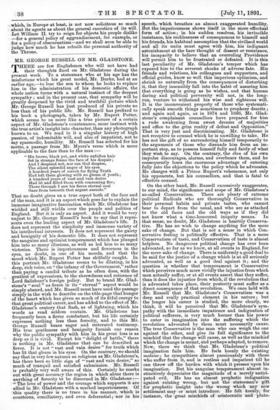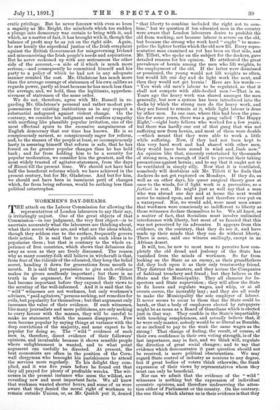MR. GEORGE RUSSELL ON MR. GLADSTONE. T HERE are few Englishmen
who will not have had their thoughts fixed on Mr. Gladstone during the present week. To a statesman who at his age has the misfortune which his great model, Mr. Burke, had at an earlier age,—to lose the son to whom he looks to replace him in the administration of his domestic affairs, the whole nation turns with a natural instinct of the deepest sympathy ; and in the present case, that sympathy will be greatly deepened by the vivid and truthful picture which Mr. George Russell has just produced of his private no less than of his public life. Mr. Russell has prefixed to his book a photograph, taken by Mr. Rupert Potter, which seems to us more like a true picture of a certain aspect of Mr. Gladstone's countenance, more instinct with the true artist's insight into character, than any photograph known to us. We read in it a singular history of high passion, of indomitable will, and also of impatient, not to say spasmodic, humility. Mr. Russell has selected for his motto, a passage from Mr. Myers's verse which is more applicable to the face than to the man :— "His brows, black yet, and white unfallen hair
Set in strange frame the face of his despair; And I despised not, nor can God despise, The silent splendid anger of his eyes. A hundred years of search for flying Truth Had left them glowing with no gleam of youth; A hundred years of vast and vain desire Had lit and filled them with consuming fire; There through I saw his fierce eternal soul Gaze from beneath that argent aureole."
That no doubt gives us a true aspect both of the face and of the man, and it is an aspect which goes far to explain the immense imaginative fascination which Mr. Gladstone has wielded and still wields over the people and politics of England. But it is only an aspect. And it would be very unjust to Mr. George Russell's book to say that it repre- sents even the leading aspect of Mr. Gladstone's life. It does not represent the simplicity and immense variety of his intellectual interests. It does not represent the gaiety and benignity of his domestic life. It does not represent the sanguine and optimist temperament which has plunged him into soniany illusions, as well as led him to so many -victories. There is imperiousness and fierceness in the eyes, no doubt, in one of his moods, and that the mood which Mr. Rupert Potter has skilfully caught. In this portrait Mr. Gladstone seems to be dilating, in his deep, rich voice, on "the infamy of the Government," rather than paying a candid tribute as he often does, with the gentlest of expressions, to the shrewdness and reticence of Lord Salisbury's foreign policy. But to brand Mr. Glad- stone's " soul " as fierce in its " eternal " aspect would be simply absurd, and Mr. Russell must have used the passage simply in the wish to describe on the title-page that hunger of the heart which has given so much of its fitful energy to that great political career, and has added to the effect of Mr. Gladstone's oratory that flash, as of lightning, which his words as read seldom contain. Mr. Gladstone has frequently been a fierce combatant, but his life certainly expresses nothing less than ferocity, and to this Mr. George Russell bears eager and reiterated testimony. His true gentleness and benignity furnish one reason why the public sympathy with him in his great loss is as deep as it is vivid. Except his "delight of battle," there is nothing in Mr. Gladstone that can be described as fierce. It is not "vast and vain desire" for truth which has lit that gleam in his eyes. On the contrary, we should say that in very few natures so religious as Mr. Gladstone's, has there been so little sign of "vast and vain desire," so much of tranquil and satisfied submission. Mr. Russell is probably very well aware of this. Certainly he marks out with great accuracy the region in which alone there is anything of ferocity to be discerned in Mr. Gladstone :— " The love of power mild the courage which supports it are allied in Mr. Gladstone with a marked imperiousness. Of this quality there is no trace in his manner, which is courteous, conciliatory, and even deferential; nor in his speech, which breathes an almokt exaggerated humility. But the imperiousness shows itself in the more effectual form of action ; in his sudden resolves, his invincible insistance, his recklessness of consequences to himself and his friends, his habitual assumption that the civilised world and all its units must agree with him, his indignant astonishment at the bare thought of dissent or resistance, his incapacity to believe that an overruling Providence will permit him to be frustrated or defeated. It is this last peculiarity of Mr. Gladstone's temper which has exposed him to the severest shocks of adverse fate. His friends and relations, his colleagues and. supporters, and. official guides, know so well this imperious optimism, and shrink so naturally from the consequences of disturbing it, that they insensibly fall into the habit of assuring him that everything is going as he wishes, and that human daring and political perversity will not, in the long- run, venture to withstand his wise and righteous will. It is the inconvenient property of those who systemati- cally speak smooth things sometimes to prophesy deceits ; and again and again, as in 1874 and 1886, Mr. Glad- stone's complaisant counsellors have prepared for him a rude awakening from sweet dreams of majorities and office to the grim reality of defeat and. Opposition." That is very just and discriminating. Mr. Gladstone is not receptive to counsel which he is unwilling to take. He has not the gift of so surrendering himself temporarily to the arguments of those who dissuade him from an im- portant step, as to possess himself fully and fairly of what they wish to say. On the contrary, the élan of his own impulse discourages, alarms, and overbears them, and he consequently loses the enormous advantage of entering fully into the objections to the policy which he advocates. He charges with a Prince Rupert's vehemence, not only his opponents, but his counsellors, and that is fatal to effective counsel.
On the other hand, Mr. Russell excessively exaggerates, to our mind, the significance and scope of Mr. Gladstone's so-called Conservatism. There are plenty of extreme political Radicals who are thoroughly Conservative in their personal habits and private tastes, who cannot bear to depart from the usual, and who are as attached to the old faces and. the old ways as if they did not know what a time-honoured. iniquity means. In that sense, no doubt, Mr. Gladstone is heartily Conserva- tive. He has no wish to change anything for the mere sake of change. But that is not a sense in which Con- servative feeling is politically effective. That is a mere Conservatism of taste, and Conservatism of taste is almost helpless. No dangerous political change has ever been advocated, so far as we know, at all events in England, for the mere sake of change. There is uniformly a good deal to be said for the justice of a change which is at all seriously advocated, as well as a good deal against it; and the question is whether that temperament is Conservative which perceives much more vividly the injustice from which men actually suffer, or at all events assert that they suffer, than it does the injustice from which, if the revolution that is advocated takes place, their posterity must suffer as a direct consequence of that revolution. We once held with Mr. Russell that Mr. Gladstone's Conservatism was a deep and really practical element in his nature • but the longer his career is studied, the more clearly, we think, it will be perceived that Mr. Gladstone's sym- pathy with the immediate impatience and indignation of political sufferers, is very much keener than his power to enter in imagination into the suffering which the revolution advocated by them must necessarily cause. The true Conservative is the man who can weigh the one against the other, and give its full significance to the mischief that the change will cause, as well as the mischief which the change is meant, ahd perhaps adapted, to remove. Now, there we think that Mr. Gladstone's political imagination fails him. He feels keenly the existing malaise; he sympathises almost passionately with those who suffer from it, and is restless and impatient till he can throw off the burden with which it presses upon his imagination. But, his sanguine temperament almost in- stinctively depreciates the magnitude of a merely antici- pated • evil. Be has an almost prophetic indignation against existing wrong, but not the statesman's gift for prophetic insight into the wrong which any new settlement may or must introduce. He felt keenly, for instance, the great mischiefs of aristocratic and pluto- cratic privilege. But he never foresaw with even so keen a sagacity as Mr. Bright, the mischiefs which too sudden a plunge into democracy was certain to bring with it, and which, as a matter of fact, it has brought with it, though the balance of profit may be as yet on the right side. Again, he saw keenly the superficial justice of the Irish complaint against the British Government for misgoverning Ireland and misconceiving the Irish people's needs and aspirations. But he never reckoned up with any seriousness the other side of the account,—a side of it which is much more serious,—and consequently he committed, himself and his party to a policy of which he had not in any adequate manner counted the cost. Mr. Gladstone has much more than the average courage of statesmen of his own calibre as regards power, partly at least because he has much less than the average, and, we hold, than the legitimate, apprehen- siveness of statesmen of the same order.
We do not, therefore, agree with Mr. Russell in re- garding Mr. Gladstone's personal and rather modest pre- possessions for existing institutions as in any respect a substantial safeguard against violent change. On the contrary, we consider his indignant and restless sympathy with anything like plausible popular irritation, one of the most effectual spurs to the excessive sanguineness of English democracy that our time has known. He is so conspicuously earnest, so conspicuously eager for reform, and, to the masses of the people at least, so inconspicuously hasty in assuring himself that reform is safe, that he has forced on far greater popular changes than he has held back ; and far from holding him to be a security for popular moderation, we consider him the greatest, and the most widely trusted of agitator-statesmen, from the days of Rienzi till the present time. We should not have had half the beneficent reforms which we have achieved in the present century, but for Mr. Gladstone. And but for him, we should not have been in imminent peril of changes which, far from being reforms, would be nothing less than political catastrophes.



































 Previous page
Previous page